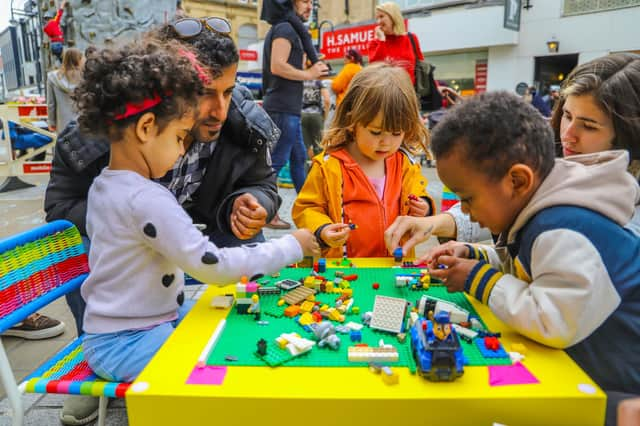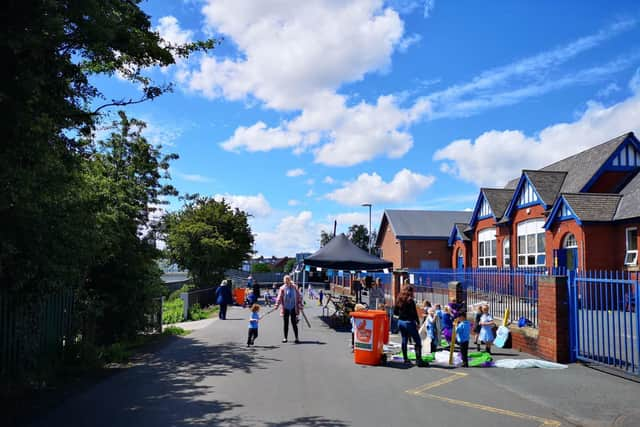“Where children play, adults linger”: The residents bringing play back to the streets of Leeds


When Leeds-based Emma Bearman first became a mother, her world changed not just in the metaphorical sense associated with becoming a parent, but in a literal sense too:
“I was coming into town and experiencing the world from the perspective of a parent for the first time...the things you experience with toddlers isn’t dissimilar to being someone with irritable bowel syndrome - you need toilets, you need places to rest...I noticed their absence”.
Advertisement
Hide AdAdvertisement
Hide AdBlogging about her experiences, Emma found many other parents frustrated by urban environments evidently designed without the needs of children or their caregivers in mind; whether doorways too narrow for pushchairs or a lack of green space for playing. As a result of her experiences, Emma set up her social enterprise “Playful Anywhere”, with a mission to bring creativity, playfulness and inventiveness to the places where people live, work and travel in Leeds.


The kind of design flaws Emma had observed don’t start and end with town centres: many inner city and even suburban housing developments lack the safe, clean space and facilities children need for socialising and playing outside of their homes or gardens.
It’s a situation replicated across the UK, explains Tim Gill, father and author of “Urban Playground” and expert in child-friendly design, largely thanks to the dominance of cars, with “the very way in which we build neighbourhoods centred around making it easy for cars to get around”.
Like many western cultures, he explains, UK neighbourhoods have surrendered a huge amount of space over to “big, dangerous metal boxes right outside our doors” which, for most of the time, “sit there doing nothing”.
Advertisement
Hide AdAdvertisement
Hide AdAs well as limiting the amount of space for children to play in, he adds, growing reliance on cars has increased the physical threat of accidents for children who do wish to play in the streets.
Paired with “stranger danger” fears, reliance on technology, parents working longer hours and the increased comfort of family homes, the past few decades have subsequently seen what Tim refers to as a “gradual lockdown” for children long before the pandemic began.
One recent study of four generations in Sheffield found, for instance, that the great-grandfather of the family was allowed to walk six miles from home by himself in 1919. In 2007, his great-grandson was only permitted to walk 300 yards - to the end of his street - alone.
In the modern world, the phenomenon of “playing out” has all but disappeared, with the “indoor generation” spending unprecedented amounts of time cooped up at home - a situation now exacerbated further by the pandemic.
Advertisement
Hide AdAdvertisement
Hide AdIn 2015, however, two Leeds mothers decided it was time for change. Returning from a trip to Bristol, they’d been inspired by an idea taking hold in the city, in which residents temporarily closed their streets and gave the space back over to kids.
The scheme was called “Playing Out”, and, when the mothers approached Leeds Council about trying something similar, the idea was enthusiastically received.
The idea was simple but powerful: on a day agreed with the council, residents would block off their road with wheelie bins and let kids play outside in whatever way they wished. The only caveats were that essential traffic would be allowed through, and that all neighbours had to agree on the closure.
Sarah Priestley, a mother living in Chapel Allerton, was one of the very first to apply for Play Streets, pushing notes through all her neighbour’s doors to explain what the scheme was, and proposing a session once per month.
Advertisement
Hide AdAdvertisement
Hide AdIt had occurred to her, she says, that “you could hear a lot of children in the neighbourhood playing in their gardens, but those children and families didn’t necessarily know their neighbours”.
“I just thought it would be amazing to connect them and offer a place where they could come together on a regular basis”.
The process of convincing her neighbours, she says, was relatively simple, with just one person questioning why children should play in the street rather than a local park.
An open conversation and seven years later, however, and the neighbour is “now a regular at our sessions”, Sarah says.
Advertisement
Hide AdAdvertisement
Hide AdThis objection - that children should play in parks and playgrounds rather than the streets - is one Tim has heard regularly. It’s a viewpoint he says is “totally opposite to [his] vision of a good and healthy childhood”.
Ask most of these adults where they played when they were young, he says, and “most people above thirty would tell you they played all over their neighbourhood, all over the city, they had a lot of freedom today’s kids don’t have”.
Play Streets offer kids a slice of that freedom back, with time spent outdoors also improving children’s health, wellbeing and social relationships.
In a study of Play Streets in Leeds, for instance, 92 per cent of children reported being happier thanks to their Play Street, while 83 per cent reported making new friends through the scheme.
Advertisement
Hide AdAdvertisement
Hide AdPlay Streets also create a ripple of benefits for everyone involved, explains Sarah, who says that the scheme has “single-handedly” brought her entire community of neighbours closer together.
“There’s thirty houses on our street and I could name every single person that lives in them, and tell you something about them”, she says, adding that these bonds have gone from strength to strength over the seven-year period since they started.
Gary Pritchard, Highways Manager at Leeds Council, echoes Sarah, pointing out that elderly people - who “usually take the most exception to Play Streets” - often end up feeling safer in their neighbourhoods after getting to know the children and families in their communities through the scheme.
“It’s not only great for the kids, it’s great for the entire community”, he says, adding that the scheme has proved highly successful in Leeds - with around 600 sessions running across 93 streets since 2015.
Advertisement
Hide AdAdvertisement
Hide AdFrom April, Leeds Council hopes to reach an even wider remit, supporting the rollout of free play boxes in priority areas across the city to ensure children from less affluent communities are reaping all the benefits of playing out.
Schemes like Play Streets are a great start on the journey to making streets, towns and cities more child-friendly, says Tim, citing former Columbian mayor Enrique Peñalosa’s assertion that “a city that’s working for children is working for everyone”.
“Where children play”, adds Tim, “adults linger”.
For too long, says Tim, town, city and neighbourhood planning has excluded children, with serious consequences beginning to be felt.
In 2020, for instance, a coroner attributed air pollution as a factor in the death of nine year-old Ella Kissi-Debrah thanks to the volume of cars driving constantly near her home in London.
Advertisement
Hide AdAdvertisement
Hide Ad“That should be really, absolutely shocking to us - that we’re living in cities where the planning system has failed children to to the extent that they’re dying”, says Tim.
Cases like this, along with the pandemic, hopes Tim, should be a catalyst for change.
In cities like Leeds, many are already taking up the mantle, with the city now one of a handful across the UK committed to being “child friendly” in planning and policy. Tim himself is part of a team currently bidding to make-over City Square into a “distinctive, playful space in the heart of the city” for kids and their caregivers.
Over the past year, says Tim, children - largely unaffected by coronavirus - have sacrificed a huge amount for the older generation. He now sees it as “our duty to compensate them” by “making over our neighbourhoods and streets to weave play and fun back into their lives”.